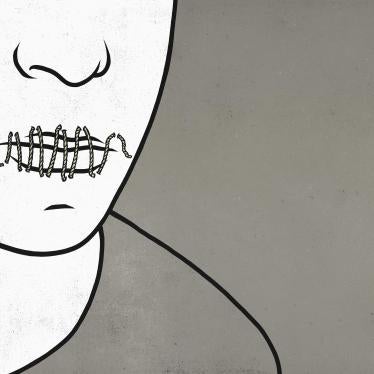(New York) - The arrests of 67 men in Riyadh on June 13, 2009, reportedly for wearing women's clothing, violate basic human rights to privacy and freedom of expression, Human Rights Watch said today. Human Rights Watch called on Saudi authorities to drop charges against the men, most of them from other countries, and release any they are still holding.
"If the police in Saudi Arabia can arrest people simply because they don't like their clothes, no one is safe," said Rasha Moumneh, researcher in the Middle East and North Africa division of Human Rights Watch.
The episode was reported by the Saudi daily Al-Riyadh on June 16 and corroborated by independent sources contacted by Human Rights Watch who asked to remain anonymous out of fear of reprisal. The newspaper reported that several men outside a private party, held in an east Riyadh neighborhood to celebrate the Philippines' Independence Day, were arrested for what the police told them was "suspicious behavior" because they were wearing women's clothing.
The police questioned the men, then raided the party, arresting 67 men in all, including one Yemeni and numerous Filipinos, Al-Riyadh reported. The police said they found more women's clothing, cosmetics, and alcohol. While Saudi law prohibits possession of alcohol, the reports indicated that it was the men's dress that prompted the police to conduct the raid and make the arrests.
Roussel Reyes, the vice consul of the Philippine embassy in Riyadh, told Human Rights Watch that the men face charges of "imitating women" and possession of alcohol. The Filipino men were released after their respective work sponsors posted bail. Human Rights Watch could not discover the whereabouts of the Yemeni national.
Shari'a law, as interpreted and enforced in Saudi Arabia, remains uncodified; no written and accessible legal standards exist that criminalize the wearing of women's clothing by men. Nevertheless, Saudi judges have in the past imposed sentences, ranging from imprisonment to flogging, on men accused of behaving like women.
In recent years, Saudi authorities have periodically raided parties and gatherings where men allegedly wore women's clothing. In March 2005, over 100 men were arrested for imitating women and sentenced in unfair trials to imprisonment and flogging after police raided a private party held in a rented hall in Jeddah. In July of that year, all of the men were pardoned and released.
How persons choose to dress and present themselves is integral to their free expression and privacy. These rights are set out in the Universal Declaration of Human Rights, which reflects customary international law. Any interference by the state in these rights should be only on the basis of clear and accessible domestic law, and then is only permitted to the most limited extent possible to meet a legitimate aim.
"Arresting and charging people simply because the police decide that their appearance is unacceptable strikes at the heart of human freedom," said Moumneh.








